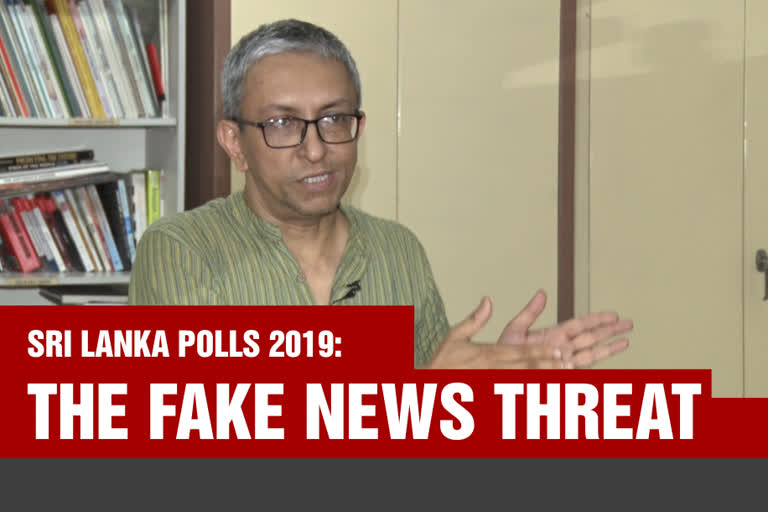Colombo:With voting for the Sri Lankan Presidential election just hours away, the focus continues to remain on both mainstream and social media, as concerns over disinformation and fake news had made their presence felt throughout course of the campaign.
On the eve of the polls, ETV Bharat spoke exclusively to prominent media analyst Nalaka Gunawardene, who explained in detail the menace of fake news and the adverse effect it has had on voters in the run-up to the polls.
Gunawardene said greater media responsibility is required CONCERN OVER FAKE NEWS
Talking about the concern over fake news, Gunawardene explained that though it was typical for campaigns to exaggerate and make false claims about their own candidates, the situation was worse this time around.
"What we saw this time around is that each campaign was trying to discredit the opponent. They were going out of their way to negatively project the opponent candidate, his ideology and also the values he stands for," he said, adding that fake news was also specifically aimed at ethnic and religious minorities in order to widen the divide between communities.
Gunawardene further voiced concerns that disinformation could add fuel to the already existing tensions that have been heightened since the Easter attacks.
TV OR SOCIAL MEDIA - WHICH IS MORE DANGEROUS?
Explaining about the overall media landscape of Sri Lanka, Gunawardene informed that broadcast television was the biggest source of information on the island, with internet too assuming an important role.
"The top five channels with the best ratings are all private channels. They have chosen to support one of the two main candidates. This is as much a battle between large TV networks as much as between candidates," he explained.
Read:India need not worry over our closeness with China: Sri Lanka
He further stated that during the campaign period, there were attempts by leading broadcasters to vilify, demonise, and negatively portray not only a candidate but also entire groups.
Citing an example of a Tamil politician being misquoted by a leading daily, Gunawardene said that even the national newspapers were at fault.
"The politician was quoted in such a way that it looked like he was endorsing a particular candidate. Though this newspaper has limited circulation, the news-clipping was picked up by channels, and it soon went viral on social media," he said, explaining that broadcast channels often amplified fake news.
Talking about social media, Gunawardene explained that though there were media monitoring groups keeping a close eye on Facebook, the systems are imperfect, as fake news still manages to filter through.
CHALLENGES TO PRESS FREEDOM
Speaking about the challenges to media freedom and the road ahead, Gunawardene said that both the main candidates had expressed their commitment towards freedom of expression.
"There are challenges. but media freedom has been improving since the last election. We have even gained points on the World Press Freedom Index," he said.
"While media freedom has improved, it has not been mirrored by media responsibility. We have a very irresponsible, reckless, and dangerous media," he added, ruing the lack of a legal media regulatory framework in the nation.
Gunawardene said that the current practice of media not being regulated cannot continue as it is inflicting damage to the Sri Lankan society and politics.
"Whoever wins will have to work with media, to find some acceptable media regulatory framework," he said.
Read: 'Post-Easter attack, we're still waiting to get justice'
